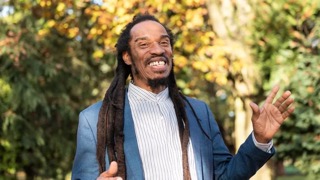Benjamin Zephaniah: A Self-Portrait in Poetry and Performance
Benjamin Zephaniah, a prodigious poet, author, and activist, left an indelible mark on the world through his powerful words and unwavering commitment to social justice. His sudden passing at the age of 65 has left a void in the literary and activist communities, but his legacy continues to resonate through his extensive body of work and the countless lives he touched with his art and advocacy. Zephaniah’s life was a testament to the transformative power of words, a power he harnessed from a young age to navigate a challenging upbringing and ultimately become a voice for the voiceless. His journey, marked by both triumphs and tribulations, underscores the importance of self-expression and the enduring impact of one individual’s commitment to truth and social change.
Born in Birmingham, England, Zephaniah’s early life was marked by hardship. He struggled with dyslexia, which led to him leaving school at 13 unable to read or write. This early setback, however, did not deter his passion for language and storytelling. He found solace and empowerment in the oral tradition, particularly within the vibrant and politically charged realm of dub poetry, a performance-based genre originating in Jamaica. By the age of 15, he had already established a reputation for himself within this burgeoning artistic movement, demonstrating an innate talent for rhythm, rhyme, and social commentary. Despite this early success, Zephaniah’s teenage years were also marked by personal struggles and a period of delinquency that resulted in a brief stint in prison. This experience, though difficult, ultimately served as a catalyst for change, propelling him towards a life dedicated to creative expression and social activism.
In 1979, seeking a fresh start, Zephaniah moved to London, immersing himself in the city’s thriving artistic scene. Surrounded by like-minded individuals, he found the support and inspiration he needed to further develop his craft. The publication of his first poetry collection, Pen Rhythm, in 1980 marked the beginning of a prolific literary career that spanned decades. Zephaniah’s work fearlessly tackled issues of race, class, and social injustice, often with a sharp wit and poignant humor. He became a prominent voice for marginalized communities, using his poetry to challenge systemic inequalities and amplify the struggles of the oppressed. His work resonated deeply with audiences both within the UK and internationally, solidifying his reputation as a powerful force for social change.
Beyond his literary contributions, Zephaniah was a tireless advocate for numerous causes, including animal rights, environmentalism, and anti-imperialism. He was a staunch critic of institutional racism and police brutality, using his platform to speak out against injustices and advocate for greater equality. He was also a vocal supporter of Rastafarianism, embracing its principles of peace, love, and social justice. His commitment to these principles was reflected in his life and work, inspiring generations of activists and artists to use their voices to challenge the status quo and promote positive change.
Zephaniah’s unwavering commitment to social justice was deeply intertwined with his artistic expression. He believed in the power of art to transcend boundaries and ignite social change. His performances were dynamic and engaging, fusing poetry with music and theatrical elements to create a powerful and immersive experience for his audience. He was often referred to as the "James Brown of dub poetry," a testament to his electrifying stage presence and the infectious energy he brought to his performances. He understood the importance of accessibility and sought to engage with audiences from all walks of life, using language that was both powerful and relatable.
Benjamin Zephaniah’s legacy extends far beyond his impressive body of work. He was a role model, a mentor, and an inspiration to countless individuals. He demonstrated the transformative power of words, not only to express oneself but also to challenge injustice and inspire positive change. His life story serves as a powerful reminder that adversity can be overcome, and that even in the face of great challenges, the human spirit can triumph. He leaves behind a rich tapestry of words and actions, a legacy that will continue to inspire generations to come. His voice may be silenced, but his message of hope, resilience, and social justice will continue to resonate, echoing through the corridors of time and reminding us of the enduring power of words to shape our world.
Share this content:












Post Comment